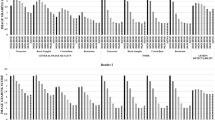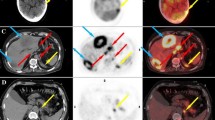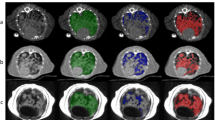Abstract
Objectives
To evaluate the diagnostic performance of brain CT images reconstructed with a model-based iterative algorithm performed at usual and reduced dose.
Methods
115 patients with histologically proven lung cancer were prospectively included over 15 months. Patients underwent two CT acquisitions at the initial staging, performed on a 256-slice MDCT, at standard (CTDIvol: 41.4 mGy) and half dose (CTDIvol: 20.7 mGy). Both image datasets were reconstructed with filtered back projection (FBP) and iterative model-based reconstruction (IMR) algorithms. Brain MRI was considered as the reference. Two blinded independent readers analysed the images.
Results
Ninety-three patients underwent all examinations. At the standard dose, eight patients presented 17 and 15 lesions on IMR and FBP CT images, respectively. At half-dose, seven patients presented 15 and 13 lesions on IMR and FBP CT images, respectively. The test could not highlight any significant difference between the standard dose IMR and the half-dose FBP techniques (p-value = 0.12). MRI showed 46 metastases on 11 patients. Specificity, negative and positive predictive values were calculated (98.9–100 %, 93.6–94.6 %, 75–100 %, respectively, for all CT techniques).
Conclusion
No significant difference could be demonstrated between the two CT reconstruction techniques.
Key points
• No significant difference between IMR100 and FBP50 was shown.
• Compared to FBP, IMR increased the image quality without diagnostic impairment.
• A 50 % dose reduction combined with IMR reconstructions could be achieved.
• Brain MRI remains the best tool in lung cancer staging.






Similar content being viewed by others
References
Brenner DJ, Hall EJ (2007) Computed tomography--an increasing source of radiation exposure. N Engl J Med 357:2277–2284
Geyer LL, Schoepf UJ, Meinel FG et al (2015) State of the Art: Iterative CT Reconstruction Techniques. Radiology 276:339–357
Pickhardt PJ, Lubner MG, Kim DH et al (2012) Abdominal CT with model-based iterative reconstruction (MBIR): initial results of a prospective trial comparing ultralow-dose with standard-dose imaging. AJR Am J Roentgenol 199:1266–1274
Murphy KP, Crush L, O'Neill SB et al (2016) Feasibility of low-dose CT with model-based iterative image reconstruction in follow-up of patients with testicular cancer. Eur J Radiol Open 3:38–45
Gandhi NS, Baker ME, Goenka AH et al (2016) Diagnostic Accuracy of CT Enterography for Active Inflammatory Terminal Ileal Crohn Disease: Comparison of Full-Dose and Half-Dose Images Reconstructed with FBP and Half-Dose Images with SAFIRE. Radiology 280:436–445
Wu TH, Hung SC, Sun JY et al (2013) How far can the radiation dose be lowered in head CT with iterative reconstruction? Analysis of imaging quality and diagnostic accuracy. Eur Radiol 23:2612–2621
Millon D, Vlassenbroek A, Van Maanen AG, Cambier SE, Coche EE (2016) Low contrast detectability and spatial resolution with model-based Iterative reconstructions of MDCT images: a phantom and cadaveric study. Eur Radiol. doi:https://doi.org/10.1007/s00330-016-4444-x
Love A, Olsson ML, Siemund R, Stalhammar F, Bjorkman-Burtscher IM, Soderberg M (2013) Six iterative reconstruction algorithms in brain CT: a phantom study on image quality at different radiation dose levels. Br J Radiol 86:20130388
Campos S, Davey P, Hird A et al (2009) Brain metastasis from an unknown primary, or primary brain tumour? A diagnostic dilemma. Curr Oncol 16:62–66
Landis SH, Murray T, Bolden S, Wingo PA (1998) Cancer statistics, 1998. CA Cancer J Clin 48:6–29
Nussbaum ES, Djalilian HR, Cho KH, Hall WA (1996) Brain metastases. Histology, multiplicity, surgery, and survival. Cancer 78:1781–1788
Schellinger PD, Meinck HM, Thron A (1999) Diagnostic accuracy of MRI compared to CCT in patients with brain metastases. J Neurooncol 44:275–281
Park HY, Kim YH, Kim H et al (2007) Routine screening by brain magnetic resonance imaging decreased the brain metastasis rate following surgery for lung adenocarcinoma. Lung Cancer 58:68–72
McCollough CH (2010) Diagnostic Reference Levels. American College of Radiology
Bongartz G, Golging SJ, Jurik AG, Leonardi M, Van Meerten EVP (1999) European guidelines on quality criteria for computed tomography. European Commission, Luxembourg
Nakaura T, Iyama Y, Kidoh M et al (2016) Comparison of iterative model, hybrid iterative, and filtered back projection reconstruction techniques in low-dose brain CT: impact of thin-slice imaging. Neuroradiology 58:245–251
Notohamiprodjo S, Deak Z, Meurer F et al (2015) Image quality of iterative reconstruction in cranial CT imaging: comparison of model-based iterative reconstruction (MBIR) and adaptive statistical iterative reconstruction (ASiR). Eur Radiol 25:140–146
Acknowledgements
Our work was presented at ECR 2017, in Vienna, during the SS1011a session (Brain tumours: imaging techniques).
Funding
The authors state that this work has not received any funding.
Author information
Authors and Affiliations
Corresponding author
Ethics declarations
Guarantor
The scientific guarantor of this publication is Pr. Emmanuel COCHE.
Conflict of interest
One author (Alain Vassenbroek) of this manuscript declares relationships with the following companies: Philips Healthcare.
Statistics and biometry
Two of the authors have significant statistical expertise.
Informed consent
Written informed consent was obtained from all subjects (patients) in this study.
Ethical approval
Institutional Review Board approval was obtained.
Methodology
• prospective
• experimental
• performed at one institution
Rights and permissions
About this article
Cite this article
Millon, D., Byl, D., Collard, P. et al. Could new reconstruction CT techniques challenge MRI for the detection of brain metastases in the context of initial lung cancer staging?. Eur Radiol 28, 770–779 (2018). https://doi.org/10.1007/s00330-017-5021-7
Received:
Revised:
Accepted:
Published:
Issue Date:
DOI: https://doi.org/10.1007/s00330-017-5021-7




